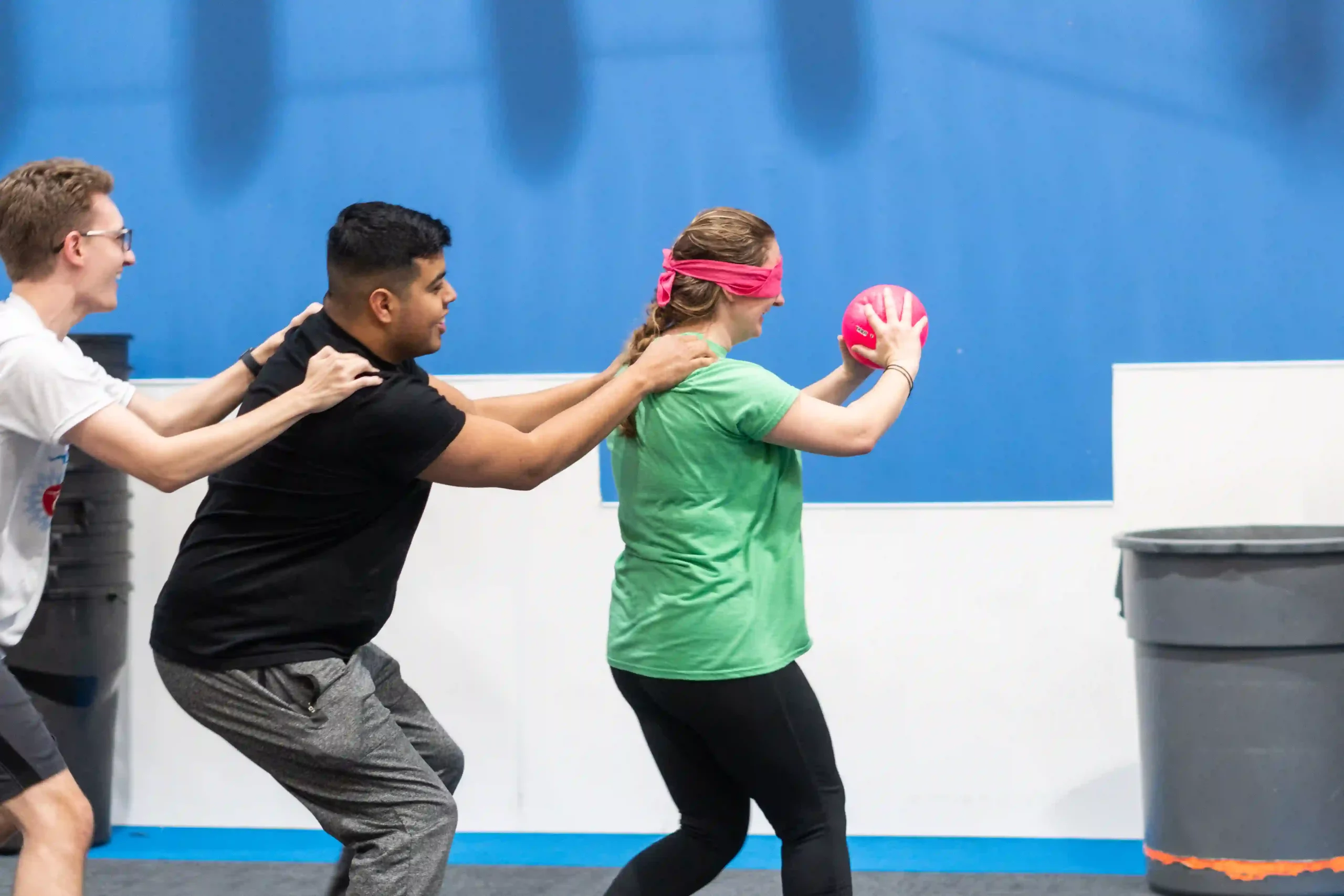
It’s important to start teaching the most important lessons in life as early as possible. The younger kids start learning skills, the more comfortable they are using those skills throughout their lives. One of the most important lessons kids can learn, one that will continue to benefit them their entire lives, is how to work with others as a part of a team. Teamwork is important not only in childhood, but it also helps kids succeed as adults.
Improve Teamwork with
Youth Team Building
Improve Teamwork with
Youth Team Building
Table of Contents
Benefits of Team Building for Kids
The benefits of team building for kids can have immediate results and will last them their entire lives.
Here’s how.
Teamwork Teaches Communication and Social Skills
The most important lesson kids can learn from working together as a team is how to communicate effectively with others. Social skills are useful in almost every situation and can help people succeed no matter their career or situation.
How to Listen
Teamwork first teaches kids how to listen, which is the first step in effective communication. Without listening, it is impossible to have a dialogue with others – communication becomes one-sided, and any sense of teamwork is lost.
Members of a team first have to listen to their coaches in order to learn how to perform their individual roles. Next, they have to learn how to listen to each other in order to function as a cohesive unit. Last, they have to learn how to listen to their opponents. This is a different type of listening that involves picking up on social cues. These social cues are an integral part of the social skills they will rely on throughout their lives.
A side effect of teaching kids how to listen is respect for others, which is an essential aspect not just of being a member of a team but of being a member of society. When kids are taught to listen, not just to hear, then they are taught that what others have to say is valid and worthy of consideration.
How to Speak
Once kids have learned how to listen to others, they can begin to learn how to speak. Of course, they already know how to talk, but speaking is something different. Speaking is about reaching an audience, about understanding how to communicate with them instead of just talking at them. While listening teaches kids to respect the ideas of others, speaking allows kids to put that respect into practice. The way in which people speak with others demonstrates their level of understanding and respect, which is a crucial part of working together as a team.
Teamwork also requires each member of the team to be able to express their own ideas and opinions effectively. Learning how to speak with others properly is an essential part of this communication. Expressing yourself effectively involves social skills, but it also involves self-confidence, which brings us to the next benefit of teamwork for kids.
Teamwork Improves Self-Confidence
When kids understand that their voices are respected and valued, they gain self-confidence. Knowing that they are being heard gives them a sense of worth and encourages participation in the team.
In this environment, even the quietest or shyest members of the team feel encouraged to participate, which can help embolden them. The more members of the team feel encouraged to participate, the better the team will perform. The more valued and respected people feel, the more their insecurities evaporate. This lessening of insecurities allows for more and better communication, which allows for better teamwork. This can become a self-sustaining cycle where participation in a team increases kids’ social skills and decreases their insecurities, both of which enhance their enjoyment of and participation in the team.
Teamwork Reduces Bullying
When kids feel like they are a part of a team that genuinely cares about its members, they will stick together in other situations as well. Teamwork can help dramatically reduce the effects of bullying on kids. Being a member of a team that cares about and supports its members can give kids a sense of worth that the acts of a bully can have a hard time affecting. By providing kids with a support system, teams can help each other deal with any situation, including bullying.
In addition, kids will feel emboldened to help others deal with the effects of bullying. Because of the increased understanding and social skills imparted through teamwork, they are better equipped to stand up for others who are the victims of bullying. The respect for others imparted through teamwork can help kids see the value in others, while communication skills allow them to vocalize their support.
Teamwork Builds Successful Adults
Kids who are self-confident and have well-developed social skills turn into well-rounded adults. Adults with these skills are, on average, happier and more successful people. Adults who work well as a member of a team are generally happier with their careers and find their work more satisfying than adults who cannot get along well with others.
There are very few careers that don’t involve working closely with at least a small group of people. The better someone is able to communicate and the better their social skills, the happier they will be as a member of this group. Employers also prefer employees who have these skills. Employees who work well with others are happier and more productive in their jobs. Of course, happy, productive employees do better in a company, leading to better pay, more promotions, more happiness, and more productivity.
Once again, we see a self-sustaining cycle that begins will good communication and social skills. Teamwork learned as a child will develop these skills early and continue to build those skills throughout life. Teamwork helps kids succeed – not only during their childhood but also as adults.
Teaching Kids Teamwork Takes a Team
Teamwork will help kids communicate with others, increase their social skills and self-confidence, and help them to develop into happier adults. Teamwork also teaches kids important skills and life lessons, but like any other skill, having a good teacher or coach is a critical aspect of the process. It takes someone with specialized knowledge and experience to guide kids through the process.
Having someone who can help kids understand how to develop these skills and show them why they are important can make a big difference. Quality instruction in team building can have a tremendous impact on how well kids learn these lessons and how quickly results from participation in a team are visible. It’s important to involve kids early in team activities that are led by a qualified and trained professional. Teamwork learned as a kid will continue to have a positive impact on the rest of a child’s life. Teamwork helps kids succeed!
Student & Youth Events
Student & Youth Events
Conclusion
If you are interested in ways you can connect, grow, and positively influence your students, we offer many free resources you can utilize today! Check out our Blog page!
Group Dynamix also offers plenty of events and activities that can be done anywhere in the U.S. to help connect and grow your students. Click here to request a quote for a team building event!

Leave a Reply